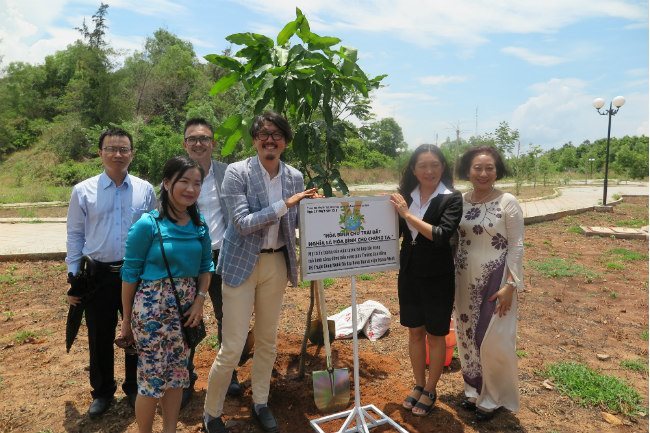 |
| Japanese environmental activist Yuji Miyata (4th L) joins a tree planting event after signing a cooperation agreement with the Ba Ria-Vung Tau College of Technology - PHOTOS: COURTESY OF YUJI MIYATA |
During his peace journey, which started in 2007, he has visited 24 countries, walked 14,000 kilometers, planted more than 5,000 trees, and held lectures at 805 schools and 300 orphanages worldwide.
Miyata has taken many environmental protection actions in Vietnam since 2009. From 2009 to 2010, he walked through the country from Hanoi to HCMC to inspire and encourage people to act on peace and environmental protection.
In 2015 and 2017, he held environmental education and tree planting programs at RMIT University Vietnam in order to raise the awareness of ecology, peace, and sustainability.
In his return to Vietnam this time, he took part in an agreement signing ceremony between Peace Week Institute and Ba Ria-Vung Tau College of Technology last week. The two sides will join hands to develop a model of sustainable community called EKOPIA. The facility will help local communities meet the long-term goal of sustainable development and welfare improvement.
After the signing ceremony in Vung Tau City, Miyata came to HCMC and spoke with The Saigon Times today over his activities, projects and visions in Vietnam and elsewhere in the world.
How do you think Vietnam’s environmental and socio-economic conditions have changed over the past 10 years?
- Through my actions in Vietnam, I have seen many changes, especially due to globalization. So many foreign investors have come to the country. GDP has expanded but unfortunately the poor are leading a much harder life than before. The number of orphans and disabled children is increasing.
I easily understand that Vietnam’s human resources and environment have been negatively impacted by this globalization trend just like other developing countries. It is very hard to see but local people’s awareness is rising slightly. These facts of hard situations in Vietnam have urged me to come back to your country to help local people.
What is your most memorable moment while in Vietnam?
- What makes me amazed is local people’s strong connections. They always support each other. Local people always welcome me to their family and treat me like a family member. It always makes me feel good in Vietnam.
Why did you decide to cooperate with the Ba Ria-Vung Tau College of Technology to create a model of a sustainable community?
- Vung Tau City is located along the coastline, so it would be hugely impacted by rising sea levels caused by global warming. Besides, it is an industrial area and is home to many people from other parts of Vietnam, so it has a golden opportunity to spread the future way of a society of “Sustainability and Localization” where all different people, especially those in rural areas, feel respected and happy.
Moreover, I am convinced that Ba Ria-Vung Tau College of Technology students could raise sustainable improvements using modern technology combined with global innovating ideas and national traditions.
What will EKOPIA comprise?
- The EKOPIA complex will include a community garden, a co-working/co-producing space, a co-care/co-education center, a community market, and more. It is a place shared by local people and for local people.
Among the projects you have done, which is the most successful?
- For me, all of the projects that I have done are successful as they have helped me spread peace messages worldwide.
What are the major environment problems that Vietnam is facing? What can we do to solve them?
- A general problem faced by Vietnamese is mindset. If Vietnamese people can have clear visions, improve time management and self management, and replan their future direction, not only environment issues but all other problems in Vietnam can be solved.
If you have one sentence to tell Vietnamese people about peace, environmental protection and sustainable development, what would be?
- Learn from your ancestors because they were the people who created the tradition and culture and protected the country. Not just follow the world trend, but focus on the ancestors’ knowledge.
Japan is internationally famous for its green and clean environment. What can Vietnamese learn from Japanese?
- Different countries have different environments, different cultures, and different mindsets. If one country just follows another country as a model, nothing can be sustainable.
Vietnam has a wonderful connection between families and communities. If Vietnamese people realize this strength, they can definitely have a sustainable society model.
What is your motto in your peace journey?
- “Never worry about numbers. Help one person at a time, and always start with the person nearest you.” This is a quote by Mother Teresa.
Every one of us has the power to make peace and the smallest thing each individual does for peace can make the world a better place.
To summarize your journey around the world to raise public awareness of environment protection in a short paragraph, what would you say?
- Peace for the Earth means peace for ourselves. Now is the time to refeel the connection with nature, remind ourselves of ancestors’ knowledge and reform our lifestyle. SGT
Minh Tuan
 Japanese environmental activist Yuji Miyata, former peace messenger for the UN and president of Peace Week Institute, is visiting Vietnam to carry out a number of environmental protection and sustainable development programs.
Japanese environmental activist Yuji Miyata, former peace messenger for the UN and president of Peace Week Institute, is visiting Vietnam to carry out a number of environmental protection and sustainable development programs.